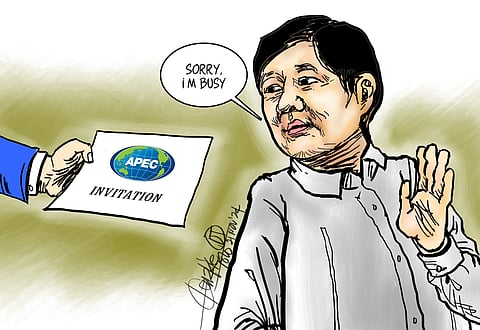
- NEWS
- the EDIT
- COMMENTARY
- BUSINESS
- LIFE
- SHOW
- ACTION
- GLOBAL GOALS
- SNAPS
- DYARYO TIRADA
- MORE

With the deluge of regional partnership deals, the Asia Pacific Economic Cooperation (APEC) forum has been sinking into irrelevance mainly because of the 21 diverse economies, including the global powers that are part of it, making the goal of a free trade zone very unwieldy.
For the past 35 years that the agreement has been in existence, APEC has been known for its social functions rather than its achievements in trade.
What comes to mind are the traditional outfits that the leaders come garbed in, among the highlights of the yearly call.
APEC evolved from previous similar groupings such as the Pacific Basin Economic Council in 1967, the Pacific Trade and Development Conference in 1968, and the Pacific Economic Cooperation Council in 1980.
Getting nations with diverse cultures and identities to agree on the complex issues of trade is next to impossible.
The 1997 Asian financial crisis, moreover, challenged the shift towards East Asian regionalism, prompted in large part by resentment of the United States for its unwillingness to help crisis-hit Southeast Asia and its heavy-handed rejection of Japan’s Asian Monetary Fund initiative.
Another East Asia group emerged in 1997, when Japan, China, South Korea and ASEAN set up ASEAN + 3 to foster financial cooperation, leading to the Chiang Mai Initiative in 2000, a bilateral and multilateral currency swap system.
The decision of President Ferdinand Marcos Jr. to skip the APEC 2024 Summit to attend to more urgent domestic concerns supports the growing view about the dispensability of the yearly function.
China, in contrast, is expected to gain big from its visible participation as it is banking on incoming US President Donald Trump to resume the protectionist policies from his first term.
Thus, it works to Beijing’s gain to drum up its role as a protector of international free trade.
In Trump’s initial term, China exploited the vacuum left by the United States with the inward focus of the American business tycoon’s administration and took the uncharacteristic role of a free market champion.
Marcos sent as his representative Trade and Industry Secretary Cristina Roque who expressed, as in previous editions of APEC, support for initiatives on the promotion of clean, low-carbon hydrogen and the reduction of food loss and waste.
She further emphasized the need for stronger partnerships, innovation, and inclusivity to navigate the complexities of the global economy, while stressing the importance of ensuring that the benefits of economic integration are shared at the domestic level, particularly among vulnerable groups, underrepresented populations, and rural communities.
With nary a whimper, APEC concluded the Economic Leaders Retreat on 16 November, marking the end of Peru’s hosting and the transition to Korea as the APEC 2025 host.
Economic integration, which is the ultimate aim of APEC, has moved grudgingly as the competing interests try to outshine each other and cooperation remains farthest from each signatory’s pursuits.
An American economist has labeled APEC “an empty shell” while many executives attending the APEC meeting consider the consulting body in the Pacific Rim as a mere talking shop, or A Perfect Excuse to Chat, a pun on its acronym.
Criticisms of the multinational grouping are mounting as the lack of tangible results in economic terms has shattered its credibility.
APEC members have long awaited the group’s evolution into a coherent bloc that would become the biggest economic community in the world.
It, however, suffers from a perpetual failure to launch.
